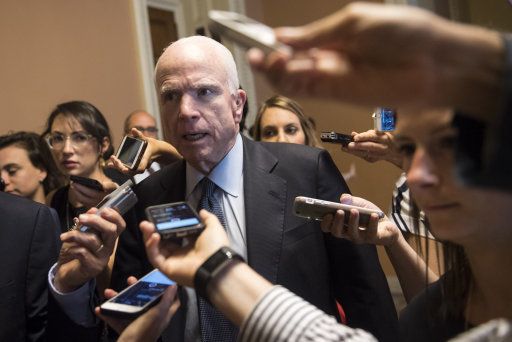It took 186 days—or more than six months—after Donald Trump’s inauguration, but it finally happened. And it was well worth the wait. On Tuesday, at long last, we got a speech that was presidential in content and tone. There was gravitas and gentle self-deprecation. The audience was transfixed. There was applause and there were laughs. And, most of all, there was respect.
Just moments later, however, Trump came to the podium and began to make comments that were the polar opposite of what we’d just heard. For that earlier speech hadn’t come from the president but from his party colleague John McCain. His performance served as a stark reminder of the absurdity of Trump’s approach to the presidency. In case you had forgotten: it shouldn’t be this way.
Those on this side of the Atlantic with a passing interest in US politics might know McCain simply as the losing GOP candidate in the 2008 presidential election, when he came second to Barack Obama. But he’s been a giant in Congress for years and, before that, was a distinguished military man. As a fighter pilot, he was shot down in Vietnam and tortured. Because his father was a high-ranking officer, McCain was given the opportunity of release, but famously refused to leave North Vietnamese custody until all those captured before him had also been set free. He is considered by many a bona fide American hero. (Although, during last year’s presidential campaign, Trump charmingly said he preferred to honour those who hadn’t been captured in the first place.)
A few weeks ago, McCain was diagnosed with brain cancer, resulting in messages of support from across the political spectrum. His return to Congress this week, in order to cast a crucial vote on healthcare reform, was met with a standing ovation. And after he cast his vote (a critical one, as it turned out), he gave the speech that has won so many plaudits, and which highlighted brilliantly the dire state of US politics today.
Referring to the naked partisanship that is such an over-riding feature of congressional politics today, he said: “Both sides have let this happen. Let’s leave the history of who shot first to the historians. I suspect they’ll find we all conspired in our decline—either by deliberate actions or neglect… I hope we can again rely on humility, on our need to co-operate, on our dependence on each other to learn how to trust each other again and, by so doing, better serve the people who elected us.”
McCain has a long history of reaching across the aisle and trying to work with opponents, but it seems his recent diagnosis has refocused his attention on the Washington gridlock, and his speech was a passionate call for his fellow senators to ratchet down the partisanship. Given the polarisation in Washington right now, it was urgently needed.
"'We had two Republicans that went against us, which is very, very sad—for them,' Trump said"Will his words rub off on Trump? Unlikely. The president delayed his White House press conference with the Lebanese prime minister until McCain’s Senate speech had finished. Then, referring to the vote that had just taken place, the president’s opening remark was: “I am very happy to announce that, with zero of the Democrats’ votes, the motion to proceed on healthcare has just passed.”
Putting aside the fact that this "progress" on healthcare was simply a Senate procedural vote ahead of further debate, and that there is no indication yet that the GOP will rally around any specific policy, Trump's opening gambit was partisanship of the highest order—exactly what McCain had just won plaudits for opposing.
Trump went on to criticise his own attorney-general Jeff Sessions (an extraordinary story in itself) before turning his fire on Obama—again, behaving exactly as McCain had just implored people not to. On a question about Syria, Trump replied: “I’m not a fan of Assad, OK?” But he then opened both barrels on Obama, calling him a liar. We had the remarkable spectacle of a US president spouting more vitriol at his predecessor than at the Syrian regime or Islamic State.
It seems that Trump’s hatred for Obama (a man McCain referred to as a “decent man” when they were running against each other in 2008) knows no bounds. The president’s speech to the annual Boy Scouts Jamboree on Monday was also littered with criticism of his predecessor—and that’s an event, if ever there is one, that is historically non-political. Every time Trump reverts to type, his inadequacy is obvious.
Returning to the healthcare vote, the president had a dig (some would say it was a threat) at two GOP senators who hadn’t supported the Republican motion. “We had two Republicans that went against us, which is very, very sad—for them,” he said.
Which takes us back to McCain’s earlier comments. Towards the end of his speech, the senator had said: “We are an important check on the powers of the executive. Our consent is necessary for the president to appoint jurists and powerful government officials and in many respects to conduct foreign policy. Whether or not we are of the same party, we are not the president’s subordinates. We are his equal.”
Most US schoolchildren know about the separation of powers, and the respective roles of Congress and the presidency, but does Trump? The impression is of a man totally out of his depth—and that impression is only growing. No wonder that so many—even some Democrats!—are longing for a return to the halcyon days when the GOP was John McCain’s party.












